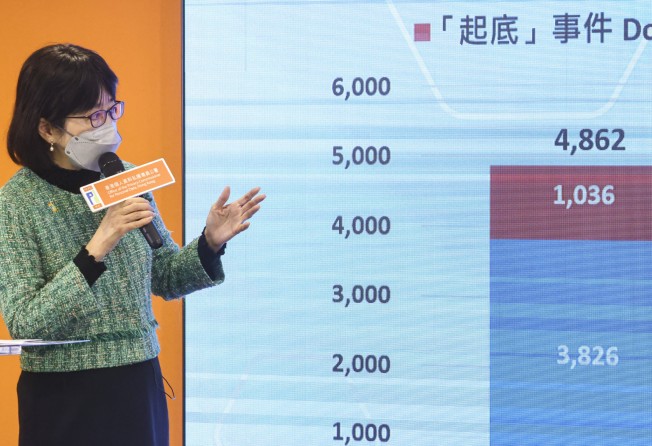
Hong Kong privacy watchdog records 15 per cent jump in complaints after anti-doxxing law introduced
- Privacy Commissioner Ada Chung says 1,500 removal notices issued to 26 social media platforms up to end of last year
- Watchdog says 3,848 complaints handled, with 46 per cent of them involving malicious disclosure of personal information

The number of complaints made to Hong Kong’s privacy watchdog last year rose by 15 per cent over the figure recorded in 2021, when anti-doxxing legislation came into force.
The Privacy Commissioner for Personal Data Ada Chung Lai-ling on Thursday said 1,500 notices were issued to 26 social media platforms to remove thousands of messages that involved doxxing – publication of personal information with malicious intent.
Chung noted that 90 per cent of requests to take down doxxing posts were accepted by social media platforms, including overseas operators that she said agreed with action to stamp out the problem.
“As our enforcement actions have been effective, there’s no need for us to consider further action,” she said, while declining to identify any of the platforms involved.

The personal data regulator last year dealt with 3,848 complaints, with 46 per cent of them involving malicious disclosure of personal information, which is illegal in Hong Kong since the privacy law amendment took effect in October 2021.
The change barred doxxing with the intent to threaten, intimidate, harass or cause psychological harm and equips the watchdog with power to force people to assist in inquiries and request the removal of offending content. It was introduced in the wake of the 2019 anti-government protests.
Police officers, demonstrators and journalists were common targets for cyber harassment.
The justice secretary at the time applied to the courts for an injunction to protect police officers and their family members from doxxing.
But only 14 per cent of the 2,128 doxxing cases handled by the office between October 2021 and December 2022 were classed as being sparked by political motives.
The watchdog said that 28 per cent were related to financial disputes and another 27 per cent involved family or relationship rows.
The office had asked social media and messaging platforms to remove 17,703 messages and channels by the end of December last year.
Article 66L of the updated law ruled that, apart from requesting removal of doxxing messages, the privacy watchdog can also ask platforms to end public access to “the whole of the relevant platform”.
Chung said she was “very happy” to report that given many overseas operators had cooperated with the watchdog’s request, escalation was avoided and that one of the platforms agreed to take down channels that had been flooded with doxxing messages.
She added online platforms that had refused to act on the watchdog’s request had taken down the offending messages after the office asked for help from its counterparts overseas.
Chung said international tech companies that had concerns about the legislation had agreed on the basic principle of ending doxxing after meetings city officials.
She insisted the legal changes had not affected the city’s freedoms.

“That has not affected normal and lawful business activities in Hong Kong and does not affect the freedom of speech and freedom of information that Hong Kong citizens currently enjoy,” Chung said.
The office had initiated 114 criminal investigations by the end of last year. A total of 32 cases were referred to police as other offences were involved or because of the severity of the doxxing behaviour.
Twelve people were arrested for doxxing over the same period, with six cases involving money and one where incitement to hatred and violence was alleged.
Anyone breaching the doxxing law faces up to five years behind bars and a fine of up to HK$1 million (US$127,385).
The watchdog also unveiled the results of an investigation involving the Hong Kong Institute of Bankers, which notified the regulator in January 2022 about a leak of personal details of 113,000 members and non-members.
The investigation found ransomware hackers had taken advantage of a loophole in the organisation’s work-from-home system that had still not been closed more than a year after the vulnerability was discovered by its firewall provider.
Chung said the institute was served with an enforcement notice that demanded action within two months to fix the problem and prevent it from happening again.
The office is also investigating a data breach involving 290,000 customers at three Hong Kong hotels managed by the Shangri-La Group.
The watchdog criticised the company last October because it only reported the incident more than two months after the problem was detected.
Chung said the investigation was expected to be finished in the first half of this year.
She admitted there had been some resistance to the office’s continued support for legislation to enforce mandatory reporting of personal information leaks, but did not give details.